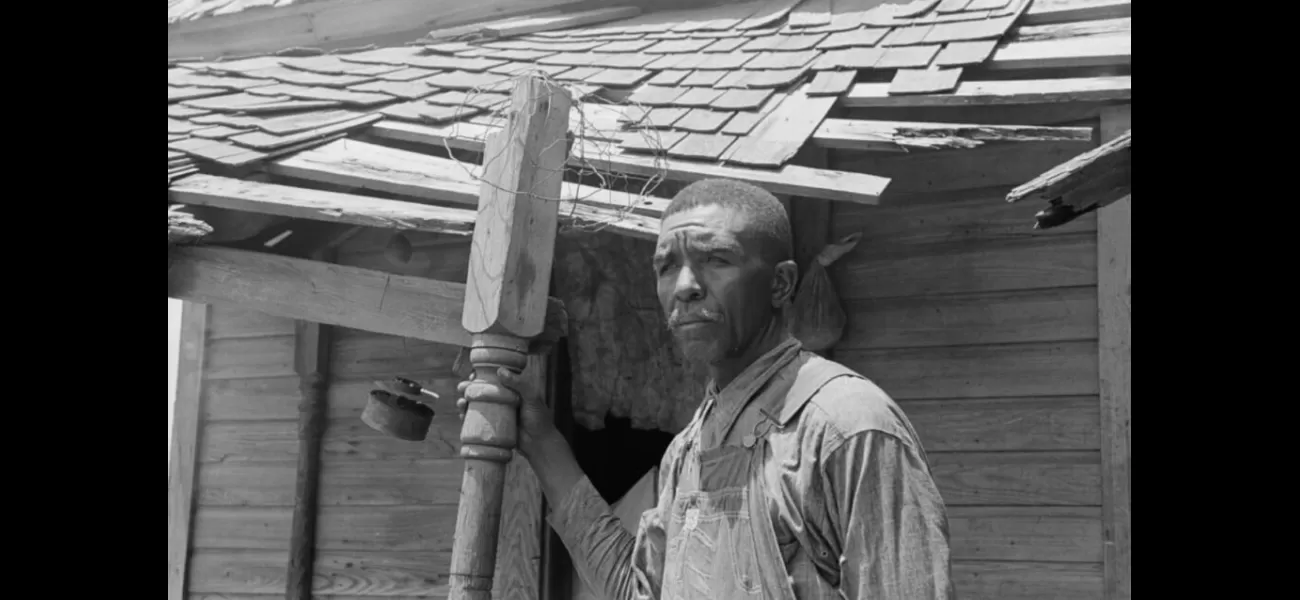New book exposes how US unfairly taxed post-slavery Black Americans, stealing $600B from them.
New book exposes how America took $600 billion from Black Americans, tracing back to the Jim Crow period.
April 24th 2024.

There's a new book that's making waves as it delves into the deep-rooted issue of how the United States has taken away a staggering $600 billion from Black Americans. Written by Andrew W. Kahrl, a professor of history and African American studies at the University of Virginia, this book is the result of extensive research. It exposes the unjust system of municipal and state taxes that has contributed to the ongoing racial wealth gap in our nation.
According to a report from Bloomberg, "The Black Tax: 150 Years of Theft, Exploitation, and Dispossession in America" is a compilation of statistics, studies, and personal accounts that illustrate how Black Americans have been systematically cheated out of land ownership and pushed into poverty through racist laws and practices dating back to the Jim Crow era. Kahrl himself writes, "This history sheds new light on the forces generating economic inequality in America and the racial character of those inequalities."
The book is a powerful combination of individual stories and in-depth information about how various municipalities across the country used complex tax collection methods to fund distribution to white land and property owners. It covers over a century of US history, starting from the late 19th and early 20th centuries, when unfair tactics were used to doubly disadvantage Black landowners. These tactics included artificially inflating property value estimates for tax calculation, overcharging them for their land, and exploiting their inability to pay as a means to seize their properties.
One example is that of Anthony Fleming and J.R. Rooks, two Black men who were forced off their farmland by White supremacist mobs. They went on to establish a town with the goal of enabling Black Americans to own land. By 1911, Edmonson, Arkansas, encompassed 30 square miles of stores, a bank, a hotel, and a post office for local Black homeowners. However, just 20 years later, this thriving town was no more. White plantation owners plotted to seize the land by imposing taxes on lots that the Edmonson residents were unaware of. Once the residents failed to pay these taxes, their land was seized and deeded over to one of the plantation owners who had concocted the scheme. All of the buildings in the town were demolished.
Another tragic example is that of Hillery Thomas Stewart Sr., the great-great-grandfather of George Floyd, who lost 24 acres of land in a tax sale "under dubious circumstances" after failing to pay a mere $18.83 in taxes. This loss of land forced the Stewart family into poverty.
When we look at the staggering figure of 11 million acres of land taken from Black Americans, it equates to a mind-blowing $326 billion in today's dollars. And that's not all – Black Americans have also overpaid millions in taxes for over a century. From 1870 to 2020, they were overtaxed by more than $275 billion in 2023 dollars.
But Kahrl doesn't just focus on the grim findings in his book. He also offers possible solutions to make up for the last century of financial oppression against the Black community. He suggests the establishment of a federal fiscal equity program, similar to Canada's approach, where funds are allocated to local governments based on their needs. He also proposes the introduction of a universal home tax exemption for numerous Americans, especially lower-income homeowners or those residing in historically neglected areas. Another option would be to impose taxes on the wealthiest individuals in the US.
Kahrl writes, "This is the past that we live with today. But it does not have to be our future." His book, "The Black Tax: 150 Years of Theft, Exploitation, and Dispossession in America," was released on Wednesday, April 24, and is available for purchase for $35 through the University of Chicago Press. It sheds light on a dark history that needs to be acknowledged and addressed, as calls for reparations and restitution for Black Americans continue to grow louder.
According to a report from Bloomberg, "The Black Tax: 150 Years of Theft, Exploitation, and Dispossession in America" is a compilation of statistics, studies, and personal accounts that illustrate how Black Americans have been systematically cheated out of land ownership and pushed into poverty through racist laws and practices dating back to the Jim Crow era. Kahrl himself writes, "This history sheds new light on the forces generating economic inequality in America and the racial character of those inequalities."
The book is a powerful combination of individual stories and in-depth information about how various municipalities across the country used complex tax collection methods to fund distribution to white land and property owners. It covers over a century of US history, starting from the late 19th and early 20th centuries, when unfair tactics were used to doubly disadvantage Black landowners. These tactics included artificially inflating property value estimates for tax calculation, overcharging them for their land, and exploiting their inability to pay as a means to seize their properties.
One example is that of Anthony Fleming and J.R. Rooks, two Black men who were forced off their farmland by White supremacist mobs. They went on to establish a town with the goal of enabling Black Americans to own land. By 1911, Edmonson, Arkansas, encompassed 30 square miles of stores, a bank, a hotel, and a post office for local Black homeowners. However, just 20 years later, this thriving town was no more. White plantation owners plotted to seize the land by imposing taxes on lots that the Edmonson residents were unaware of. Once the residents failed to pay these taxes, their land was seized and deeded over to one of the plantation owners who had concocted the scheme. All of the buildings in the town were demolished.
Another tragic example is that of Hillery Thomas Stewart Sr., the great-great-grandfather of George Floyd, who lost 24 acres of land in a tax sale "under dubious circumstances" after failing to pay a mere $18.83 in taxes. This loss of land forced the Stewart family into poverty.
When we look at the staggering figure of 11 million acres of land taken from Black Americans, it equates to a mind-blowing $326 billion in today's dollars. And that's not all – Black Americans have also overpaid millions in taxes for over a century. From 1870 to 2020, they were overtaxed by more than $275 billion in 2023 dollars.
But Kahrl doesn't just focus on the grim findings in his book. He also offers possible solutions to make up for the last century of financial oppression against the Black community. He suggests the establishment of a federal fiscal equity program, similar to Canada's approach, where funds are allocated to local governments based on their needs. He also proposes the introduction of a universal home tax exemption for numerous Americans, especially lower-income homeowners or those residing in historically neglected areas. Another option would be to impose taxes on the wealthiest individuals in the US.
Kahrl writes, "This is the past that we live with today. But it does not have to be our future." His book, "The Black Tax: 150 Years of Theft, Exploitation, and Dispossession in America," was released on Wednesday, April 24, and is available for purchase for $35 through the University of Chicago Press. It sheds light on a dark history that needs to be acknowledged and addressed, as calls for reparations and restitution for Black Americans continue to grow louder.
[This article has been trending online recently and has been generated with AI. Your feed is customized.]
[Generative AI is experimental.]
0
0
Submit Comment





